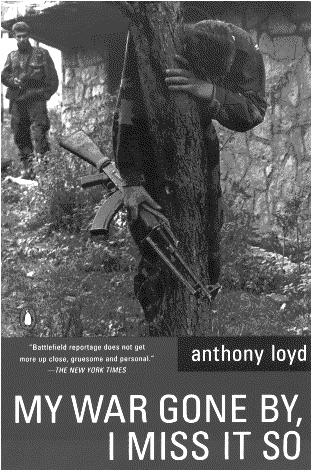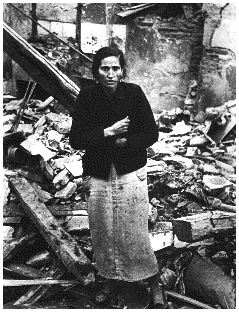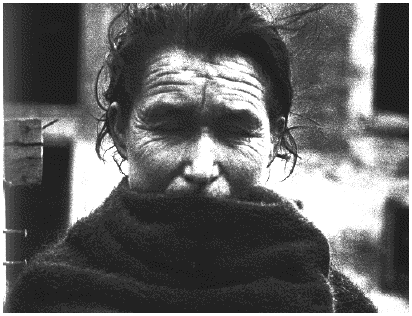I Miss it So
Anthony Loyd
(Penguin)

It isn't that he was completely separate from war and the military and soldiering. When he was in his post-Eton days, he decided to join the Light Division of the English military (during the time of Kuwait):
The recruiting major at the depot near Winchester asked me why I wanted to join and I went through a well-rehearsed patter about the sense of challenge and responsibility. I could hardly tell this urbane man the truth, that I just wanted to go to any war as soon as possible. In retrospect perhaps I should have done so, for there is still much honour attached to the profession of arms in Britain and, ironically, once I was in the regiment I found that my real feelings were shared by most of the other young Light Division officers. Some were even more vitriolic than me, and came right out with it: We want to know what killing is like. The words hang in my mind. If you are a young man of combat age frustrated by the tedium and meaninglessness of life in twentieth-
It's one of those books that comes out of the blue to blow one away. Whether he's talking about atrocities or being strung out on drugs or what to do when The Big Fear of Dying first hits you in the middle of battle or how irritating the UN spokesmen are or how soldiers have their own strange good-luck charms and touchstones or, most of all, Loyd living knowing what any reasonably civilized person shouldn't have to come across, in Bosnia, where he saw the body of a Russian girl:
In her early twenties, long haired and lithe, she had caught a bit of shrapnel in her chest, one of those tiny wounds that you would not believe could take a life but does. In death the rude sun-burnish went from her skin, retreating before an ethereal blue glow. Alive she was strikingly pretty. Dead she was so beautiful you could have raised an army to sack Troy just for possession of her casket. I had not wanted to look too far into the reaction within me and walked away from her presence, unnerved for days.
 He's a reporter's reporter --- or better, the kind of person you and I would want having around to report on our war, if we happened to be in the middle of one (we are: it's called The War on Drugs. That one figures in this book, too).
He's a reporter's reporter --- or better, the kind of person you and I would want having around to report on our war, if we happened to be in the middle of one (we are: it's called The War on Drugs. That one figures in this book, too).
My War Gone by, I Miss it so is also a growing-up book. He starts out as a young stoner, bored and restless, and we get to watch him turn into a reporter --- he becomes one by default as other reporters for the London papers began to die off or get the hell out.
We also see him learn how to not fall apart under gunfire, or how not to turn crazy when he sees three women slaughtered by the Serbs and Croats and HVO (another temporary alliance) in the village of Stupni Do (!) by the professional cleansers under the tutelage of one Ivica Rajic. Rajic is described so clearly that you know he is a resurrection of the Ustasa, the brutes that ran Yugoslavia terrorism during WWII. He's just such a hoodlum --- one of the many who come along as part of the baggage of any war when the opportunists find chinks in which to take over what's left of civilization and help get rid of it.
Loyd cannot clarify the reasons why the Serbs were fighting the Croats who were fighting the Muslims who were, at the same time, occasionally, fighting the Serbs. He claims that, at a raw minimum, there were seven different wars, but he can't explain exactly who was doing what to whom and why they were doing it except to say that when Tito died, anyone who knew Yugoslavia knew it was going to happen, and that when it began,
If you were of combat age, meaning only that you possessed the strength to fight, kill and possibly survive, then you were conscripted into whichever army represented your denomination, Muslim, Serb, or Croat. So carrying a weapon was not in itself an indication of guilt. It was more the attitude of the armed individual that gave the clue to what was going on; and generally the Croats in central Bosnia, like the Serbs before them, were drinking more readily from the poisoned chalice of nationalism.
We watch Loyd start out as a loner, an outcast, a dropout, and then get involved in the war to such a degree that he is forced to become not only a reporter, but one trapped in war almost (almost) as much as the Serbs, Croats, and Muslims. He wasn't contented with hanging out in the briefing rooms listening to factotums spout propaganda and he couldn't make enough money on photographing because he admits he's not very good and besides, he says that it's hard as hell to come up with a photo, the photo, say, of a naked child running down the street screaming after being napalmed or showing a military commander executing someone with a hand-held gun.
All through all of this, while writing about brutality and trying to convince us (and himself) that there comes a time when it doesn't touch you, he is showing us a man, he, Loyd, our Everyman on the spot, immersed in death and dying and so many insults to the soul that it makes one want to surrender one's membership in The Humanity Club and move to another planet and be alone with the stars, out of the orbit of this world.
 I can't think of any reporter or writer except Ryszard Kapuscinski who is so able to touch one by just being there at a place where one can, in a moment, no longer be alive --- someone ding-ey enough to put themselves in direct danger in order to come out with a bit of artful writing that may or may not make sense of something that is, ultimately, senseless, but which works anyway because the two of them are such brilliant stylists.
I can't think of any reporter or writer except Ryszard Kapuscinski who is so able to touch one by just being there at a place where one can, in a moment, no longer be alive --- someone ding-ey enough to put themselves in direct danger in order to come out with a bit of artful writing that may or may not make sense of something that is, ultimately, senseless, but which works anyway because the two of them are such brilliant stylists.
The pressure of it --- reflected so meaningfully in the prose --- helps as well to make sense of Loyd's addiction to heroin. After all, what's left of his soul and the soul of war are so intimately interwoven that to become entangled in a deadly habit makes perfect sense, as the Bosnian war turns into a deadly habit for a part of the world not so distant from our own. His tales of women and children being butchered comes to be not unlike what heroin does to the self --- for a drug habit is but a civil war carried into one's own body:
Withdrawal is the kind of thing you like a little warning of. Like going to the front, you need to steel yourself against the potential pain and fear of it all before you cut off and throw yourself in there...I cannot have had more that four or five hours' sleep in the previous three days and exhaustion was beginning to breach the crumbling drug walls. The sweat was upon me, a pungent sheen smelling of burned rubber that coated my body from head to toe; the inside of my nose felt like I had inhaled caustic acid; my mouth was sore and foul tasting. Worse of all was the soul-ripping depression that slipped in quick on the heels of the drug's last slow paraglide.
The whole mess in Bosnia was such a feckless conflict, which in turn makes it a strange mix --- this junkie immersed up to his ass in a screwball internecine brawl: as weird as if they had sent Alestair Crowley to mail dispatches from the Boer War, or William Burroughs to report on the Nazi invasion of Russia, or Jean Genet to wire news-stories from Viet-Nam.
Loyd ends up generating a strange affection in the heart of this reader --- affection for his unsparing vision, and for what that vision does to his psyche. Like the blind Oedipus, he sees too much, must somehow rip his own eyes out. Anyone who can confess forthrightly what it's like to like a merciless terrorist is someone we'd want to know, read, and maybe even hang out with for awhile.